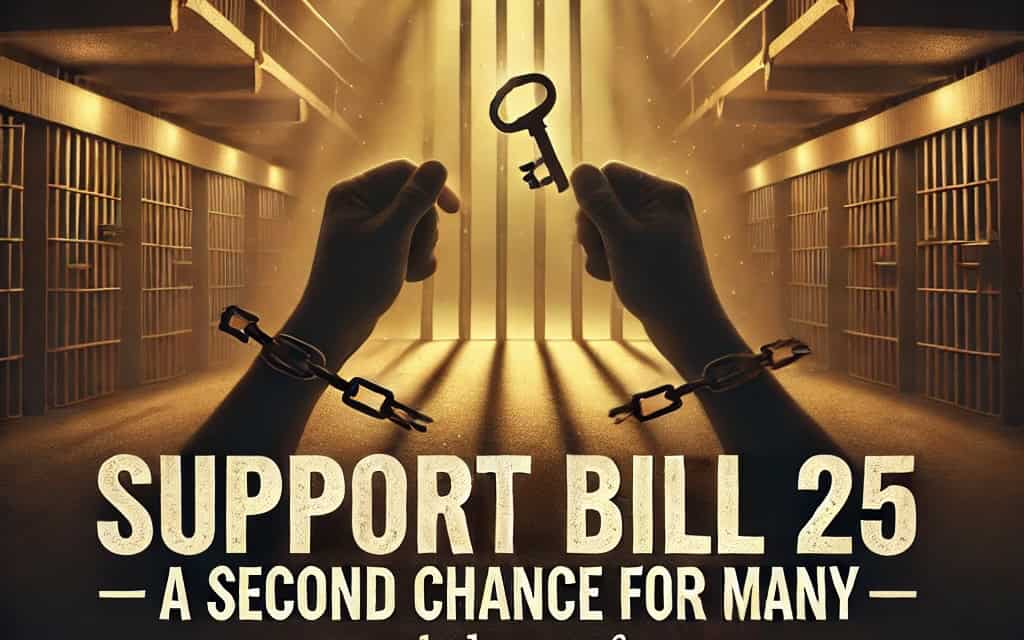The 2025 legislative session has ended without this bill even getting out of committee. We all need to push much harder between now and next January when the next legislative session begins.
Thanks to everyone who advocated for change.
Please Advocate for this bill. Chose the topic: Parole Board Practices and Releases, generate your message and send to legislators.
Please CLICK HERE and Comment on this legislation using the LegiScan system: GA SB25 | 2025-2026 | Regular Session. Let’s push hard to get this bill passed.
Share this page to help spread the word:
Here is the text of Senate Bill 25:
BE IT ENACTED BY THE GENERAL ASSEMBLY OF GEORGIA:
SECTION 1.
Article 2 of Chapter 9 of Title 42 of the Official Code of Georgia Annotated, relating to grants of pardons, paroles, and other relief, is amended by adding a new Code section to read as follows:
“42-9-43.2. (a) If any offender has accumulated the maximum number of credits available under any performance incentive program provided by the Department of Corrections, or if such offender is serving a sentence of life imprisonment and is being considered or reconsidered for parole, such offender may request: (1) A video conference at least 30 days in advance of the tentative parole date with all members of the board before any decision can be made on parole, in which the offender has a reasonable opportunity to present information and questions to the board regarding: (A) The nature of the offense, including any procedural matters relating to the conviction and sentencing of such offense; (B) The conduct and completion of programming while the offender was incarcerated; (C) Community ties and other support for the offender; (D) The victim or victim’s family or other individuals that would be affected by the offender’s release; and (E) The position of the prosecuting attorney and the court regarding the offender’s case; and (2) Written findings of fact, including the queries provided in paragraph (1) of this subsection, that provide the basis for the board’s decision to deny parole or delay such offender’s tentative parole release month, and provide on the record: (A) Any affiliates or representatives of the offender that the board contacted and received information from regarding the offender’s prospective release; (B) Any affiliates or representatives of the victim or victims that the board contacted and received information from regarding the offender’s prospective release; and (C) Whether such contact was made telephonically, electronically, or in person. (b) In any case where three members of the board have tentatively decided to deny parole or delay the tentative parole month, the other two members shall be notified of the tentative decision and given 14 days to hold the decision before it is issued. During such time such two members may discuss the decision with the other members of the board, and the majority who tentatively decided to deny parole or delay the tentative parole month shall, within their discretion, have the opportunity to change their votes. (c) All duties prescribed in subsection (a) of this Code section are nondiscretionary and shall be subject to the provisions of Code Section 9-6-20.“
SECTION 2.
All laws and parts of laws in conflict with this Act are repealed.
AI Summary
This bill modifies procedures for parole consideration in Georgia, primarily focusing on offenders who have completed maximum performance credits or are serving life sentences. The bill requires the Parole Board to conduct a mandatory video conference hearing at least 30 days before a potential parole date, during which the offender can discuss their case, including details about their offense, prison conduct, community ties, victim impact, and legal perspectives. The board must now provide detailed written findings explaining their decision if parole is denied or delayed, including information about who they consulted during their review process. Additionally, the bill introduces a new procedural step where if three board members initially vote to deny parole, the other two members must be notified and given 14 days to discuss and potentially reconsider the decision, ensuring a more collaborative and transparent review process. These new requirements are considered mandatory and subject to existing administrative procedure laws, with the goal of providing more comprehensive and fair parole consideration for eligible offenders.
Gail Davenport (D)*, Jason Esteves (D)*, Sonya Halpern (D)*, Ed Harbison (D)*, Sally Harrell (D)*, Kim Jackson (D)*, Donzella James (D)*, Emanuel Jones (D)*, Harold Jones (D)*, RaShaun Kemp (D)*, Randal Mangham (D)*, Josh McLaurin (D)*, Nikki Merritt (D)*, Nan Orrock (D)*, Elena Parent (D)*, Sheikh Rahman (D)*, Doc Rhett (D)*, Freddie Sims (D)*, Kenya Wicks (D)*,
Track this legislation through the process here.
How to Advocate for Change
Getting changes to the parole system starts with raising public awareness and putting pressure on decision-makers. Here’s how you can help:
1. Contact Your Representatives: Reach out to your state senators and representatives to advocate for SB25 and demand that the parole board comply with its provisions. You can use tools like Impact Justice AI (https://ImpactJustice.AI) to easily craft and send messages to lawmakers.
2. Mobilize Your Network: Ask your friends, family, and fellow advocates to do the same. The more voices legislators hear, the harder it is to ignore public demand for justice.
3. Contact Media Outlets: Write to local and state media to highlight the importance of SB25 and share personal stories or data about the need for parole reform. The media plays a key role in amplifying these issues and putting pressure on the parole board and lawmakers.
4. Write USPS Letters: In addition to emails, handwritten or typed letters sent via mail to legislators and media outlets have a powerful impact. They demonstrate a strong commitment to the cause and often stand out among digital messages.The key is to ensure the word gets out that people care deeply about justice and fairness in Georgia’s prison system. By mobilizing collective voices, we can push for meaningful change. Be a part of this movement!
